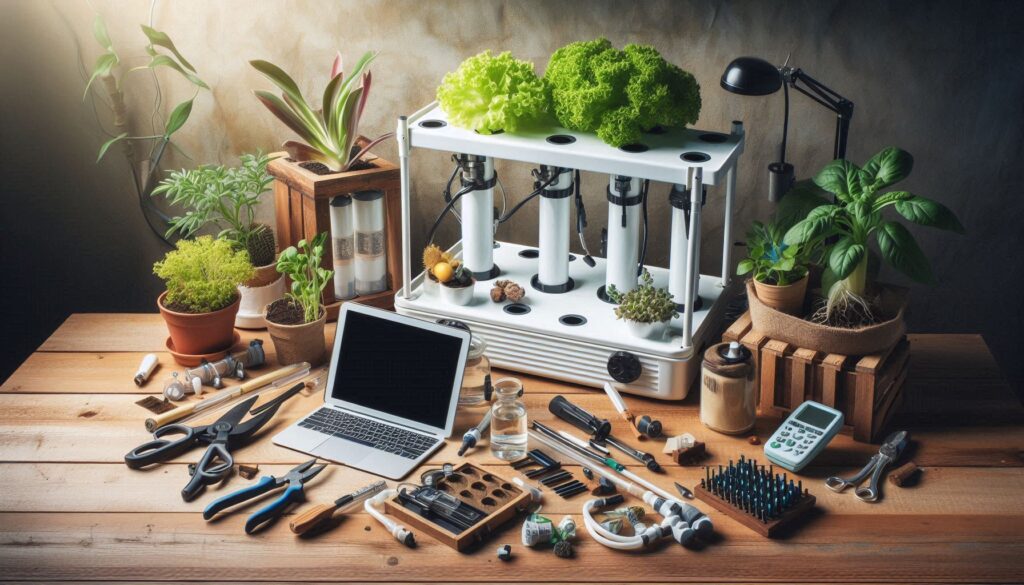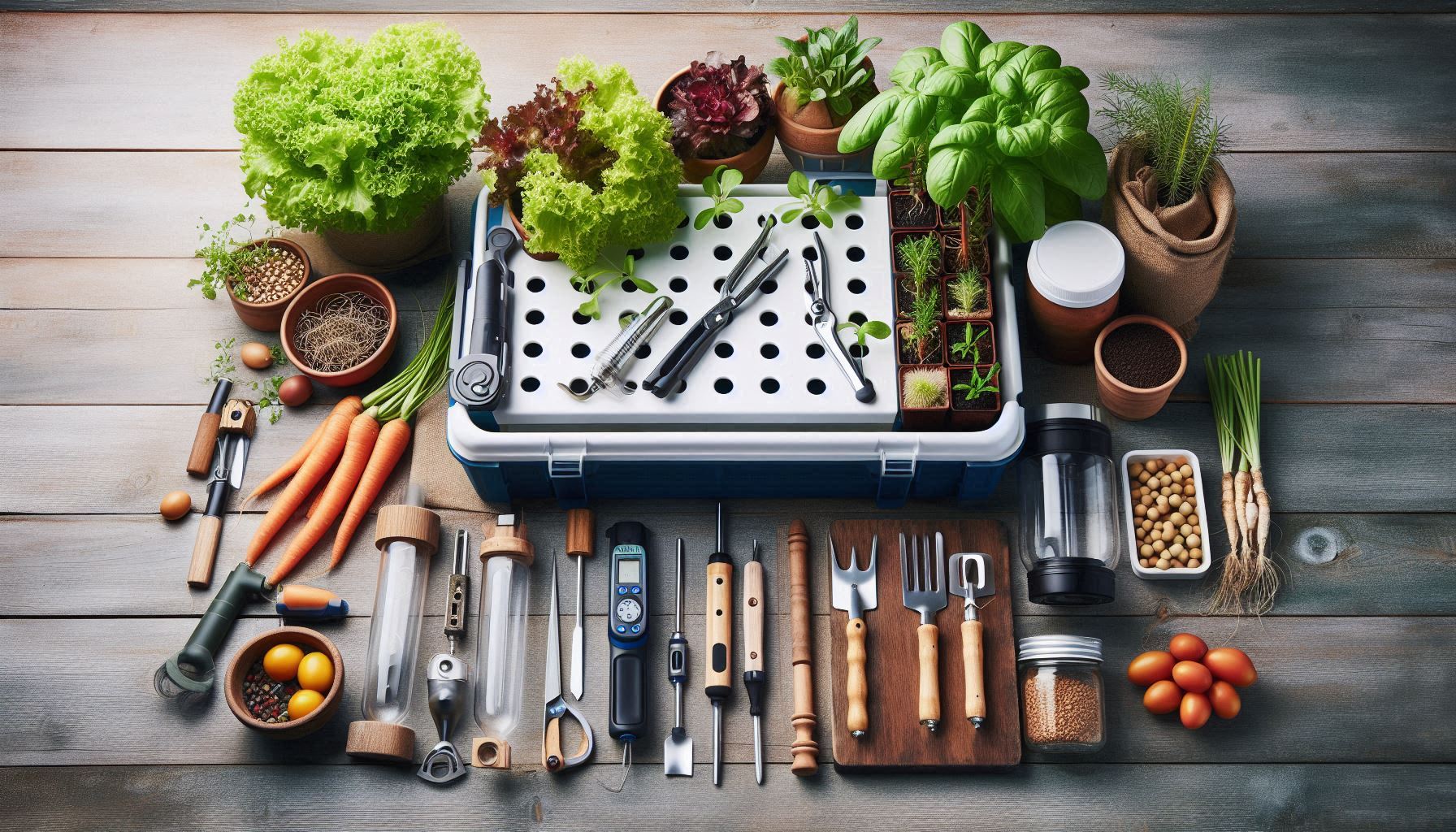Setting up a hydroponic garden can be an exciting and rewarding venture for both novice and experienced gardeners. Hydroponic gardening offers a convenient and efficient way to grow plants without the need for soil, providing an environment where plants can flourish and thrive. To ensure the success of your hydroponic garden, it is essential to have the right tools and equipment on hand. In this comprehensive guide, we will explore the essential tools and equipment needed to set up a successful hydroponic garden.
- Grow Lights
One of the most critical components of a hydroponic garden is adequate lighting for plant growth. Since plants in a hydroponic system do not have access to natural sunlight, artificial grow lights are essential to provide the necessary light spectrum for photosynthesis. There are various types of grow lights available, including fluorescent, LED, and high-intensity discharge (HID) lights. LED lights are commonly preferred for hydroponic gardens due to their energy efficiency and customizable light spectrum options.
- Grow Tent or Grow Room
Creating a dedicated space for your hydroponic garden is essential for maintaining environmental control and maximizing plant growth. A grow tent or grow room provides a controlled environment where temperature, humidity, and lighting can be regulated to optimize plant health. Choose a grow tent or grow room size that fits the number of plants you plan to grow and consider factors such as ventilation and access to power outlets when selecting your setup.
- Nutrient Reservoir and Pump

In a hydroponic system, plants receive essential nutrients through a nutrient solution that is circulated through the system. A nutrient reservoir is used to store and mix the nutrient solution, while a pump is used to circulate the solution through the system to deliver nutrients to the plant roots. Select a nutrient reservoir size that accommodates the number of plants in your garden and choose a reliable pump that can effectively deliver the nutrient solution to the plants.
- Growing Medium
Unlike traditional soil gardening, hydroponic systems use growing mediums to support plant roots and provide stability. Common growing mediums used in hydroponic gardening include rockwool, perlite, vermiculite, coconut coir, and clay pebbles. Select a growing medium that suits your plant species and system type, ensuring good water retention and aeration to promote healthy root development.
- pH and EC Meters
Monitoring and maintaining the pH and electrical conductivity (EC) levels of the nutrient solution are crucial for plant health and growth in hydroponic systems. pH meters and EC meters are essential tools for measuring and adjusting these parameters to ensure plants receive the right balance of nutrients. Regularly test the pH and EC levels of your nutrient solution and make adjustments as needed to optimize plant growth.
- Timer
A timer is an essential tool for controlling the lighting schedule in your hydroponic garden. By automating the lighting cycle, you can ensure that plants receive the right amount of light each day, promoting healthy growth and development. Choose a timer that allows you to customize the on/off schedule based on your plant’s specific light requirements.
- Air Pump and Air Stone
Proper aeration is essential for plant root health in hydroponic systems as it helps deliver oxygen to the roots and prevent root rot. An air pump and air stone are used to oxygenate the nutrient solution, promoting healthy root growth and nutrient uptake. Select an air pump that provides adequate airflow and choose a quality air stone to distribute oxygen evenly throughout the nutrient solution.
- Water Quality Testing Kit
Maintaining water quality is crucial for the success of your hydroponic garden, as poor water quality can impact plant health and growth. A water quality testing kit allows you to monitor important parameters such as pH, EC, dissolved oxygen, and nutrient levels in your water source. Regularly test your water supply and make any necessary adjustments to ensure that the nutrient solution meets your plants’ needs.
- Nutrient Solution
Hydroponic plants rely on a nutrient solution to provide essential nutrients for growth and development. It is essential to choose a high-quality hydroponic nutrient solution that contains the right balance of macro and micronutrients for your plant species. Follow the manufacturer’s recommendations for dilution and application to ensure that plants receive the proper nutrition for healthy growth.
- pH Up and pH Down Solutions
pH up and pH down solutions are used to adjust the pH levels of the nutrient solution in hydroponic systems. If the pH strays outside the optimal range for plant growth, pH up or pH down solutions can be added to bring the pH back into the desired range. Keep both pH up and pH down solutions on hand to make precise adjustments to the nutrient solution as needed.
- Trellis or Plant Support System
Many hydroponic plants, such as tomatoes and cucumbers, benefit from a trellis or plant support system to encourage vertical growth and prevent sprawling. A trellis provides structural support for plants as they grow, helping to maximize space and airflow in your hydroponic garden. Choose a sturdy and adjustable trellis system that can accommodate the growth of your plants throughout the growing season.
- Thermometer and Hygrometer
Monitoring temperature and humidity levels in your hydroponic garden is essential for maintaining optimal growing conditions for plants. A thermometer and hygrometer allow you to track temperature and humidity fluctuations, helping you adjust environmental controls as needed to create an ideal growing environment. Place thermometers and hygrometers in different areas of your grow space to ensure uniform conditions for plant growth.
- Pruning Shears or Scissors
Regular pruning and trimming are essential tasks in hydroponic gardening to promote healthy growth and maximize yields. Pruning shears or scissors are essential tools for removing dead or damaged plant material, shaping plant growth, and harvesting fruits and vegetables. Keep your pruning tools clean and sharp for precise cuts that promote plant health and productivity.
- Pest and Disease Control Supplies
Preventing and managing pests and diseases is crucial for maintaining plant health in hydroponic systems. Keep a supply of pest control products, such as insecticidal soap, neem oil, or beneficial predators, on hand to address common pests like aphids, whiteflies, and spider mites. Additionally, familiarize yourself with common plant diseases and have appropriate fungicides or bactericides available to treat any outbreaks that may occur.
- Work Gloves and Protective Eyewear
When working in a hydroponic garden, it is essential to prioritize safety by wearing appropriate protective gear. Work gloves protect your hands from cuts, abrasions, and exposure to chemicals, while protective eyewear shields your eyes from potential hazards like splashing nutrient solutions. Choose gloves that provide a comfortable fit and offer good dexterity, and opt for safety glasses or goggles that provide adequate eye protection during gardening tasks.
- Measuring Spoons and Cups
Accurately measuring nutrient solutions and additives is essential for providing plants with the right balance of nutrients for healthy growth. Keep a set of measuring spoons and cups on hand to measure out precise amounts of nutrients, pH adjusters, and other additives for your hydroponic system. Use dedicated measuring tools for each product to prevent cross-contamination and ensure accurate dosing for optimal plant nutrition.
- Plant Labels and Markers
Organizing and labeling your plants is essential for tracking growth progress, identifying plant varieties, and recording maintenance tasks in your hydroponic garden. Use plant labels and markers to clearly indicate each plant’s species, planting date, and any specific care instructions. Labeling plants helps you stay organized and ensures that you can easily track the development of your garden over time.
- Cleaning Supplies
Maintaining cleanliness in your hydroponic garden is crucial for preventing mold, algae, and disease outbreaks that can harm plants. Keep a supply of cleaning supplies, such as a mild soap solution, hydrogen peroxide, or bleach, on hand to sanitize equipment, trays, and reservoirs regularly. Clean and disinfect your hydroponic system components to promote a healthy growing environment and prevent contamination that could affect plant health.
- pH Calibration Solutions
Calibrating your pH meter regularly is essential for accurate pH measurements in your hydroponic system. pH calibration solutions are used to ensure that your pH meter is calibrated correctly and provides precise readings of the nutrient solution’s acidity or alkalinity. Follow the manufacturer’s instructions for calibrating your pH meter using the appropriate pH calibration solutions to maintain accuracy in pH testing.
- Maintenance and Repair Tools
Being prepared to address maintenance issues and equipment failures is crucial for the smooth operation of your hydroponic garden. Keep a set of maintenance and repair tools on hand, such as adjustable wrenches, screwdrivers, pliers, and tubing cutters, to troubleshoot common issues and make necessary repairs. Regularly inspect your hydroponic system components and address any leaks, clogs, or malfunctions promptly to ensure the continued success of your garden.
In conclusion, setting up a successful hydroponic garden requires careful planning, investment in quality tools and equipment, and ongoing attention to plant health and environmental conditions. By equipping yourself with the essential tools and supplies needed for hydroponic gardening, you can create a thriving and productive growing environment for a wide range of plant species. Whether you are a beginner or experienced gardener, having the right tools on hand will help you achieve success in your hydroponic gardening endeavors and enjoy the benefits of growing healthy, vibrant plants year-round.

